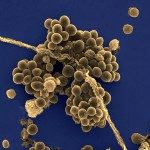Lien vers Pubmed [PMID] – 12148636
Int. J. Syst. Evol. Microbiol. 2002 Jul;52(Pt 4):1247-55
The taxonomic dissection of the Streptococcus bovis-Streptococcus equinus group was carried out upon obtaining sequences for the manganese-dependent superoxide dismutase gene (sodA) of the type strains of S. bovis, Streptococcus caprinus, S. equinus, Streptococcus gallolyticus, Streptococcus infantarius, Streptococcus macedonicus and Streptococcus waius. The sodA sequences of 29 streptococcal strains of animal and human origin that were related to S. bovis were also sequenced. A phylogenetic analysis of the sodA sequences revealed that the S. bovis-S. equinus group comprises five different clusters that correspond to five distinct species. The type strains of S. bovis and S. equinus were associated in the same cluster, corresponding to the species S. equinus. The type strains of S. caprinus, S. gallolyticus, S. macedonicus and S. waius were associated in the same cluster, which defined a single species containing S. gallolyticus and its junior synonym S. caprinus, and S. macedonicus and its junior synonym S. waius. The two subspecies thought to constitute the species S. infantarius, namely S. infantarius subsp. infantarius and ‘S. infantarius subsp. coli’, were located in two distinct clusters. One of these clusters defined the species S. infantarius and included the type strain of S. infantarius subsp. infantarius. The other cluster defined ‘S. infantarius subsp. coli’, leading to the proposal of its reclassification as the novel species Streptococcus lutetiensis (NEM 782T = CIP 106849T). The remaining cluster comprised all of the strains previously identified as belonging to S. bovis biotype 11.2, leading to the proposal to reassign these strains to the novel species Streptococcus pasteurianus (NEM 1202T = CIP 107122T). The results of the phylogenetic analysis were confirmed by DNA-DNA hybridization experiments, thus demonstrating that sequence databases of defined DNA targets, such as sodA, may constitute a valuable alternative approach for modern bacterial systematics.

